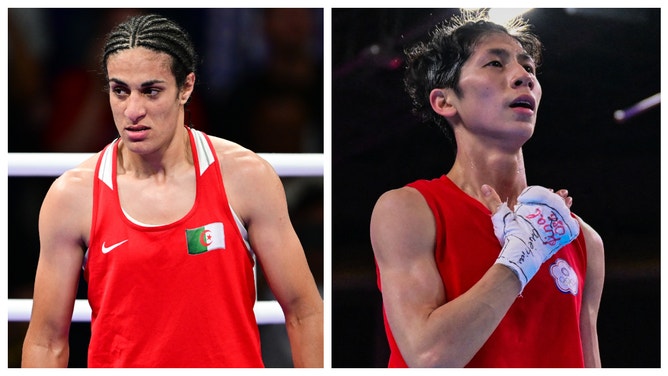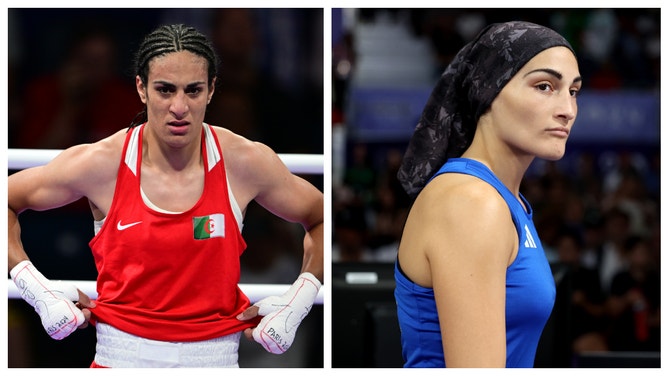Olympic Boxers Khelif & Lin Might Be Victims, But That Doesn't Mean They Should Get To Compete | Dan Zaksheske
Life isn't fair.
That's an adage that the majority of American kids are told early and often in their lives. Although, it seems that in modern times, kids are getting a different message more frequently: "You can be whoever you want to be, don't let anyone tell you otherwise."
Personally, I prefer the "life isn't fair" mantra. Sure, it may not be as uplifting, but it holds far more truth in how the world operates than the latter.
That brings us to the biggest controversy at the 2024 Summer Olympics in Paris. Two boxers – who were disqualified from previous competitions for failing gender tests – are competing in the women's division.
Both athletes – Imane Khelif of Algeria and Lin Yu-ting of Taiwan – have reached the semifinals in their weight classes and are poised to medal in women's boxing.

It's OK to feel bad for Olympic boxers Imane Khelif (left) and Lin Yu-tIng (right), who failed gender tests, but also believe they shouldn't be fighting against women.
(Getty Images)
We don't have all the information about these two athletes, but we do know that the IBA (International Boxing Association) says that both were subject to genetic testing and both have XY chromosomes.
Normally, when we see an XY athlete in women's sports it's usually because that athlete is transgender. Think Lia Thomas. But based on all the evidence we have thus far, the most reasonable conclusion with these Olympic boxers is that they suffer from Difference of Sexual Development (DSD) — meaning they have both male and female genitalia.
It's an incredibly rare disorder, and if true, it's very sad that these people suffer from such an uncommon affliction.
Which is why it's perfectly reasonable that many people are expressing sympathy for these two athletes and trying to defend them from "hate."
Here's the problem: Just because we have sympathy for Khelif and Yu-ting doesn't mean they get to "be whoever they want to be."
This is where the "life is unfair" maxim fits better. It's unfortunate that they suffer from this condition, but that doesn't mean they get to call themselves women and fight in the Olympics.
It's sad that many kids are born with Cerebral Palsy, and we do everything we can to help them through life, but they don't compete in the Olympics, either.
There are just some things that people do not get to do. Sorry, that's the way it is.
Personally, I'd rather be playing shortstop for the Cincinnati Reds than writing articles. But, I wasn't talented enough to accomplish that. Just because I want it doesn't make it so.
Counterarguments about allowing Imane Khelif and Lin Yu-ting to fight against women in the Olympics fall flat
There are those who argue that the two boxers were raised as girls and are listed as women on their passports. They also argue that there is no unfair advantage, or that we don't know enough to know if there's an unfair advantage.
This is a bad faith argument. Anyone who has watched either of these two fight in the Olympics can see plainly that they are built differently than their more typical female opponents.
Imane Khelif and Lin Yu-ting carry their weight differently; they have more lean muscle mass; they are taller and have longer reach than the women in their weight classes. Everyone can see these discrepancies.
These are traits that are caused by having male reproductive organs. And it doesn't take a biologist to be able to look at these two athletes and realize that they are just different.
If I handed someone a picture – with no additional context – of Imane Khelif and a picture of Angela Carini, the opponent who quit during the first round against Khelif, and asked 100 people "One of these boxers has XY chromosomes, can you tell which one?"

Imane Khelif (left) defeated Angela Carini (right) in an Olympic boxing match.
(Getty Images)
How many would point to Khelif? 85? 95? 98? All 100?
I'm betting the answer is closer to 100 than 85.
Does that make those people "bigots"? Or does it mean they have eyes and common sense?
Again, I feel bad for Khelif and Yu-ting. I really do. They are likely suffering from a rare disorder that has radically affected their lives.
And it's OK for people to try and help them in any way that doesn't interfere with other people living their lives.
But therein lies the crux of the issue. We cannot allow the feelings of Khelif and Yu-ting to overtake those of their opponents.
That's not inclusivity and that's not kindness. It might seem like it, but it isn't.
What is actually happening here is fairly simple. Imane Khelif and Lin Yu-ting are considered victims of their circumstances and thus are awarded special treatment.
In this case, they are handed preferential treatment over their female opponents, many of whom have expressed frustration about it.
That's what happens when the victimhood culture permeates society. Everyone rushes to declare their own victimhood status so they can get in on the special treatment. After all, who doesn't want to be treated as "special"?
Maybe Khelif and Yu-ting are victims. But it doesn't do them any service to treat them as victims or award them special treatment.
That's where we've lost our way. Sympathy and empathy are good to have, but we shouldn't change the rules for people deemed "victims."
It may seem like we're helping them, but the opposite is true. We're just shielding them from the realities of life.
Which, by the way, isn't always fair.